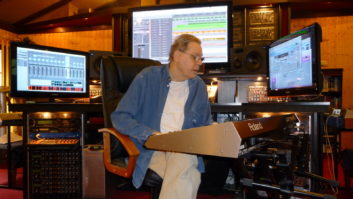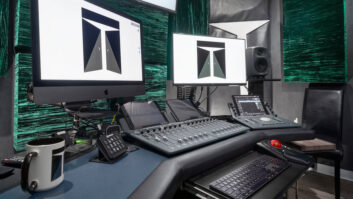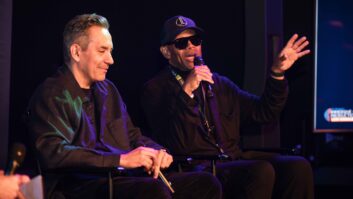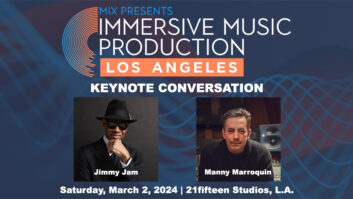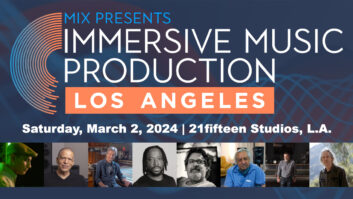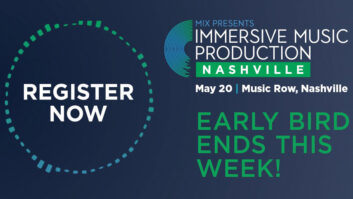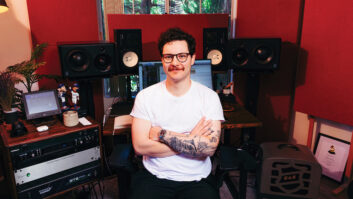For many of us, Def Leppard represents the mass onset of ’80s ‘anthem rock’—but beyond this stereotypical persona is a tight knit, sharp-edged band that has worked and toured relentlessly since its debut album On Through The Night—which hit the New Wave Of British Heavy Metal scene in the U.K. and the U.S. more than 35 years ago. Now, after almost non-stop touring and a nearly 10-year drought between studio records, the band has re-emerged to release Def Leppard. So what can possibly be new? For one thing, they were free of record company pressures and were able to build the album solely ‘for the love of music’. Pro Sound News caught up with co-lead guitarist Phil Collen as he was catching his breath in between shows.
On recording freely:
When we have done albums in the past, there has always been a brief; an album was to be in this style or that. For this album, we didn’t have any brief; we went in to do a single or an EP, and then the writing and recording process started flying almost effortlessly. None of the songs had anything to do with each other, yet all of a sudden, everything turned out very naturally. The reason you get in a band in the first place is for the love of the music. It is the purest Def Leppard album we’ve ever done, and I think it’s the best thing we’ve done since Hysteria. The entire process was never a chore or a push, and there was no record company executive telling us we had to do: it was just us wanting to write music.
On working with legendary producer Mutt Lange:
Whenever Mutt Lange was involved with our music, it was amazing. He was always guiding us along, saying, ‘The songs and the production have to be better! The performances have got to be stronger, harder, faster!’ I sat next to him for years playing guitar and singing vocals, and ended up learning a lot from this. He basically told me how to play a guitar properly in the studio—how to listen for the snare and the backbeat—while teaching me to play more aggressively. Each of us learned how to sing from him, and he imparted his own sound to all of us. In fact, both Joe and I still sing like Mutt, because that’s how we were taught.
On working in ‘the studio’:
‘The studio’ is a very weird term these days. For example, a lot of this album and the [side-project] Delta Deep album were recorded in my kitchen on my laptop, and I’ve been doing it this way for years. The main thing is the artistry of it: It is about the songs and the vibe and this is most important. Obviously, it is wonderful going into a studio, but sometimes you can go into a studio without any songs, an idea or a concept—you can just sit there and burn dollars away. Now, I do my stuff at home and it is a joy—and I think you can hear this on the tracks.
On finding the edge:
Some of the songs on this album sounded very different in their earlier states. For example, “Let’s Go” sounds like your typical Def Leppard song, but when we started off, it almost sounded like a Boy Band song. We listened again and again, and said, ‘No, no, it’s got to be more aggressive.’ Before you know it, you have the song dictating to you where it is going. That is a great way of recording songs—you can come up with an idea and it can end up with something completely out of left field that you didn’t see coming. That’s the wonderful thing about art: You can start out with one thing and when you get inspired to take a quirky turn, the magic happens.
On being a rock ‘n’ roll guitarist:
When I started playing guitar, it was a scratch that I could itch and it offered me a brand-new way to express myself. Now, by playing live and in the studio. I am constantly learning and improving on the things that I do, and sometimes I stumble. I worked with Mutt Lange a couple of years ago and he was playing things on the guitar that I’ve never heard in my life—I tried, but I couldn’t play them. But later, I ended up writing a song based on some of the progressions he was showing me. It is always great to be around other people who can inspire you, and for me, Mutt is one of those people.
On joining Def Leppard:
Def Leppard auditioned me on the song ‘Stagefright’, which was on the Pyromania album. When I played with them, I immediately noticed that Steve Clark’s [former co-guitarist] guitar parts were just amazing. Now you listen to them in the current context and they seem more familiar. But when I first heard the combination of Steve’s playing, the keyboard parts and the vocal arrangements, I had never heard anything like that in my life and thought it was unique. In general, that was the vibe of the Pyromania—there was so much depth that it was almost overwhelming, almost like when you hear an orchestra. That was the Mutt Lange production of Def Leppard, and the part that just blew me away.
On David Bowie:
David Bowie changed my life. When I saw him on Top of the Pops when I was 14, my life went from black and white to color. His confidence in his own sexuality, his vibe and confidence in his own songwriting was just awesome. The music was very guitar driven, but it was always the great songs underneath that actually made it work. The entire thing really affected me in every which way.
